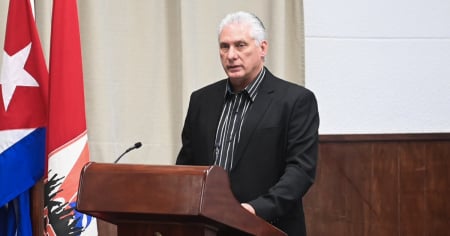The Cuban leader, Miguel Díaz-Canel, stated on Friday during a speech at the IX Plenary of the Communist Party that his government is prepared to face the possibility of Donald Trump's return to the presidency of the United States.
During his address to the Cuban communists, Díaz-Canel noted that the most recent electoral scenario in the United States did not catch his government by surprise, and he reaffirmed his willingness to resist any increase in aggression towards the island.
"The most recent election result in the United States did not surprise us, just as we are not surprised by the euphoric dance of the haters desperate to sing the end of the Revolution that they have not been able to defeat," declared the leader.
Furthermore, he assured that "aware of this reality, we are ready to face this new scenario with equanimity and without fear, but alert and prepared."
He emphasized that his government will not yield to attempts of interference nor abandon the socialist path. “The answer is not, and will not be, to make concessions to those who seek to destroy and dominate us. We will overcome the current difficulties with creativity, enhancing development programs based on talent, innovation, hard work, and creative resilience,” he stated, resorting to his usual phrases filled with empty rhetoric.
According to Díaz-Canel, they maintain a willingness for respectful dialogue with the United States, although he made it clear that any attempt at intervention will be rejected. "We will keep our hand open to the people of the United States, especially to the Cubans living there, and we are open to respectful dialogue with their government. However, any attempt at interference will be firmly rejected," he stated.
Despite the defiant tone of Díaz-Canel's speech, the internal reality of Cuba stands in stark contrast to the official narrative.
The island is facing one of the most severe economic crises in decades, characterized by shortages of food, medicines, and other basic goods, as well as prolonged blackouts and a massive exodus of citizens in search of better living conditions.
While the government insists on blaming the U.S. economic embargo as the primary cause of these difficulties, both internal and external critics point to the inefficiency of the Cuban economic model and the lack of structural reforms as key determining factors.
Experts indicate that internal policies, such as excessive centralization and the lack of incentives for private initiative, have also contributed to the deterioration of living conditions.
During his first term (2017-2021), Donald Trump implemented over 200 restrictive measures against Cuba, reversing the rapprochement initiated by his predecessor, Barack Obama.
Regarding Trump's return to the White House and its impact on U.S. policy towards Cuba, Cuban-American Congressman Mario Díaz-Balart has stated that a second term for Trump could increase pressure on the regimes in Cuba, Venezuela, and Nicaragua.
Díaz-Balart stated that these regimes are "weak and wobbly" and that, with four more years of Trump in the White House, they would face "many difficulties in staying in power."
Frequently Asked Questions about Cuba-U.S. Relations Following Trump's Victory
How is the Díaz-Canel government preparing for a possible return of Trump to the presidency of the United States?
The Cuban leader, Miguel Díaz-Canel, stated that his government is ready to confront Donald Trump's return to the presidency of the United States. He emphasized that they will not yield to attempts at interference and will promote development through creativity and innovation, without renouncing socialism.
What measures did Trump implement against Cuba during his first term?
During his first term, Donald Trump implemented over 200 restrictive measures against Cuba, reversing the thaw initiated by Barack Obama. These measures included economic and diplomatic restrictions, intensifying the embargo against the island.
What is Díaz-Canel's stance on the United States economic embargo?
Miguel Díaz-Canel blames the United States economic embargo for many of the internal problems in Cuba, including the economic crisis and the shortage of basic goods. However, critics point out that the inefficiency of the Cuban economic model and the lack of structural reforms are also key factors.
What does Congressman Mario Díaz-Balart think about the impact of a second Trump term on Cuba?
Cuban-American Congressman Mario Díaz-Balart has stated that a second Trump administration could increase pressure on the regimes in Cuba, Venezuela, and Nicaragua. He predicted that these dictatorships would face significant challenges in remaining in power under a stricter Trump administration.
Filed under:
